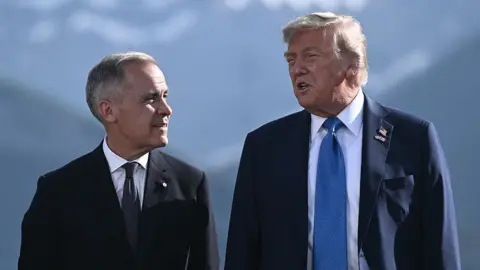BBC News, Toronto
 Getty Images
Getty ImagesDeal or no deal, what Wes Love wants is certainty. His Toronto-area business, Taurus Craco, imports machinery from overseas and distributes it across North America, mainly to the United States.
But President Donald Trump’s shifting tariffs on Canadian products have left him, like many independent business owners, unable to plan for the future.
“What has been creating indecision in the market is people don’t know which way this is going to go,” Mr Love told the BBC in June.
“And in small businesses, indecision is killer.”
Taurus Craco was hit hard by the tariffs earlier this year when it was forced to shell out nearly C$35,000 ($25,500, £18,700) because a shipment to the US crossed the border a few minutes after one deadline.
“It is totally punitive. From a small business perspective, that’s more than the cost that we spend on hydro and gas for the entire year,” he said.
Even though Trump paused that tariff a few hours later, Taurus Craco still had to pay. Refusing would mean no longer being allowed to transport its products into the US, Mr Love said.
“It’s like dealing with the mob,” he said.
Canada is in a tit-for-tat tariff war with its largest trading partner, faciing a series of levies, in particular on metals and auto.
Since taking office in January, Trump has announced a series of import taxes on goods from other countries – arguing they will boost American manufacturing and protect jobs.
The ensuing uncertainty has hit Canada’s economy and intense talks between the two countries hit a snag on Friday.
 Getty Images
Getty ImagesPrime Minister Mark Carney has called Trump’s tariffs “unjust”, and said while campaigning for the April election that the “old relationship” with the US is “over”.
Shortly after winning that election, the prime minister visited Washington DC, taking a more conciliatory message to the White House to launch talks on a new trade and security deal.
A 16 July deadline since has been set to hash out that deal, and President Trump said at the recent G7 summit that he was optimistic the two countries could “work something out” on trade.
But on Friday, Trump said he was cutting trade talks over Canada’s digital services tax.
“We are hereby terminating ALL discussions on Trade with Canada, effective immediately,” he wrote on social media.
Carney has threatened to impose another round of retaliatory tariffs on the US if the talks aren’t successful.
Mr Love welcomes any prospect of a deal.
“Give us a set of rules and leave them alone and let us operate within those rules,” he said.
“It’s like sport, right? Everybody goes onto the field and you play to a set of rules, but you don’t change the rules in the middle of the game.”
Gaphel Kongtsa, international policy director at the Canadian Chamber of Commerce, said businesses are hopeful an agreement will bring stability.
Thus far, they have had to navigate a very fluid landscape, he said, “where seemingly things get increased or decreased or added on without very much clear indication as to why”.
Canada is hugely reliant on trade with the US, with 75% of its exports heading south, according to Statistics Canada.
Its economy has slowed significantly in the first quarter of 2025 as a result of trade war and the ensuing uncertainty – growing only 0.8% between 1 January and 31 March, according to the Canadian Federation of Independent Business (CFIB).
It shrank 0.1% over a month in April.
A timeline of the tariffs shows what a whirlwind few months it has been.
On 1 February, Trump imposed a 25% tariff on most Canadian imports, then suspended them for a month days later. They were re-imposed when that deadline expired, only to be again delayed.
Not long after, he granted an exemption on all goods that were compliant with the current North American free trade deal, known as the USMCA.
Then in March, the US imposed a global 25% tariff on imported steel and aluminium as well as on imported vehicles.
This month, Trump raised the metals tariff to 50%.
 Ali Abbas Ahmad/BBC
Ali Abbas Ahmad/BBCThe manufacturing sector has been in the spotlight when it comes to the tariffs, but the service sector also is affected by the uncertainty, if not by the levies directly.
Sam Gupta is the founder and CEO at ElevatIQ, a technology and management consultancy that operates out of Buffalo, New York, and in Toronto.
Mr Gupta said most people don’t think about the service sector during a period of uncertainty, calling it the “unloved stepchild” of the economy.
“The attention goes to all the manufacturing companies and the companies that are directly impacted by the supply chain,” he said.
Still, services – which encompass everything from finance to tourism – make up a huge proportion of Canada’s economy, accounting for the vast majority of its…
Explain It To Me Like I’m 5: Business owners in Canada are worried about changing rules and taxes from the U.S. that make it hard for them to plan and sell their products, which can hurt their businesses.
Want More Context? 🔎









